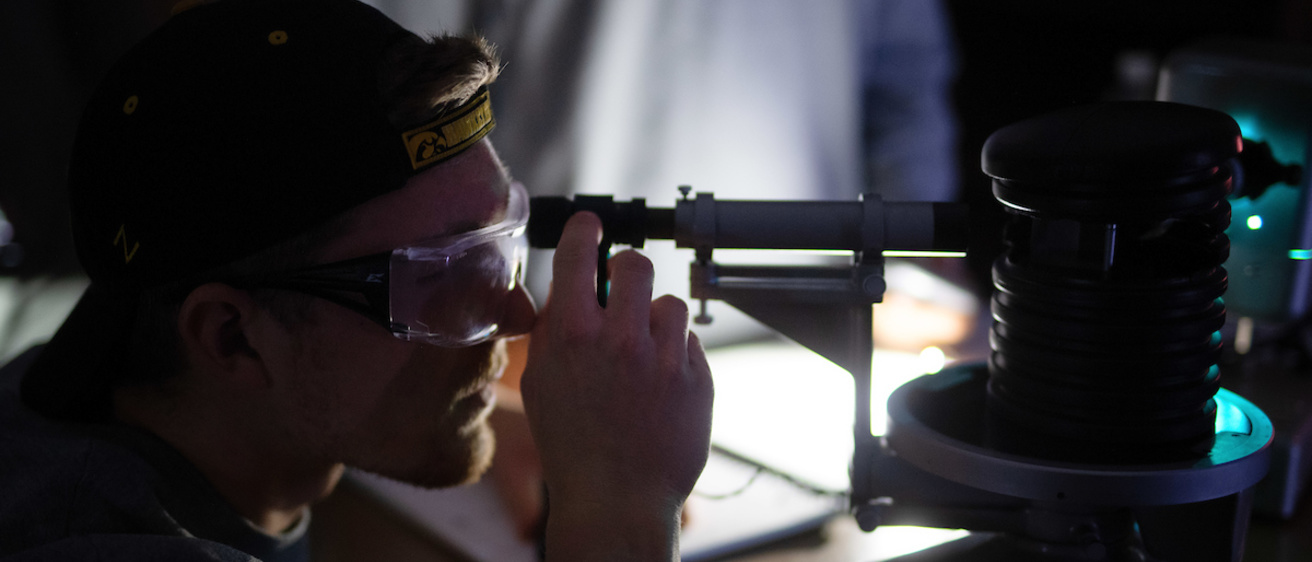The major in Applied Physics is intended primarily for students interested in a broad program of study in Physics combined with a significant concentration of courses in a field that has immediate application to industry.
This degree provides a foundation for a wide range of employment opportunities in high-technology industries, including research and development, product design and testing, sales, and quality control. It also is designed to include sufficient exposure to Physics to allow students to continue with graduate studies in either Physics or Astronomy.
Iowa's Department of Physics and Astronomy offers a renowned faculty and challenging courses on a variety of subjects, with coursework emphasizing problem-solving, logical thinking, and technical skills. Advanced classes usually have 15-20 students, allowing for a high level of individual attention.
Outside of class, students conduct research, apply for internships at national laboratories, and participate in the Society of Physics Students, which coordinates field trips and activities to foster student-faculty interaction and scientific learning. Also, Iowa students are extraordinarily successful at competing for research opportunities at other top universities and at research laboratories.
Students interested in this major need to meet the requirements for admission to the College of Liberal Arts and Sciences.
Information

First-Year

Transfer

International
Within six months of graduating, 96 percent of Iowa graduates are employed, continuing education, or not seeking work. Our Pomerantz Career Center offers multiple resources to help students find internships and jobs.
About 70 percent of majors go on to graduate school in some of the best programs in the country. Many graduates with a concentration in Medical Physics attend medical school.
Physics and Astronomy graduates have mastered skills that are readily transferable to a number of fields, including research, engineering, software development, teaching, finance, biomedical research, and consulting.
In addition to more than 600 Student Organizations, Iowa students choose from more than 100 Study Abroad Programs and multiple Undergraduate Research Opportunities.
Most Applied Physics majors participate in research projects and work directly with faculty members. Students may earn course credit for research. Some funding is available for undergraduate research through individually funded faculty projects, the Iowa Center for Research by Undergraduates, and the department's Van Allen Research Grants.
The University of Iowa provides a variety of scholarships to eligible undergraduate students through the Iowa Scholarship Portal. Scholarships are available to first-year, transfer, and currently enrolled students. For additional details on scholarships for your program of study, check directly with your department or college.
The Office of Admissions and the Office of Student Financial Aid are great resources for students seeking scholarships.
Students choose one of these concentrations: Computer Science, Optics, Solid-state Electronics, or Medical Physics. Successful completion of a related one-semester internship or practicum experience in a research laboratory is required. Typically, this is done during the summer (full-time) or during one or more semesters. The student usually works in industry or in a research laboratory on campus.
In addition to required courses, students complete a common set of courses that includes calculus, linear algebra, physics, and an experiential learning course. The department encourages students to take additional coursework, and advisors can suggest electives that will enrich programs and help students prepare for graduate work.
All students who wish to earn a bachelor's degree in the College of Liberal Arts and Sciences must complete the GE CLAS Core requirements.
